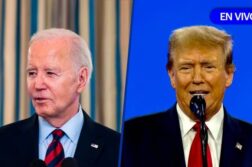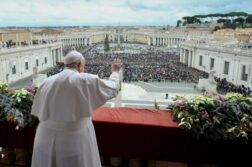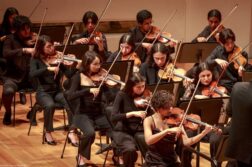Evgeny Afineevsky and Pope Francis
The image of a rainy and empty San Pedro Square due to the coronavirus pandemic and a lonely Francisco addressing the center is the powerful metaphor with which the Oscar-nominated director Evgeny Afineevsky His latest documentary begins, a very cinematographic look at the personality and actions of the Argentine pope.
“Francesco”, which premiered this Wednesday at the Rome Film Festival, is a documentary dedicated to “a Humanity that creates dramas and disasters, and to him, who with humility and wisdom, tries to guide us to build a better future”, says Afineevsky in an interview with Efe. In the feature film, the Catholic leader surprised with statements in favor of a civil union between people of the same sex.
“Homosexual people have the right to be in the family, they are children of God, they have the right to a family. No one can be thrown out of the family, or make life impossible for that, “said Pope Francis in the film, about his approach to pastoral care.:quality(85)//cloudfront-us-east-1.images.arcpublishing.com/infobae/E6W6UCUHCFEVFOKQGT4HE3LHJU.jpg) The documentary poster
The documentary poster
In the analysis of his work, the director expressed: “I do not see it as a documentary about the Pope, it is a documentary about all of us, all of Humanity that creates disasters, attacks the environment, mounts all these wars that make people flee. migrants, creates sexual abuse, which not only exists in the Church, but also in Hollywood ”.
“He tries to help us navigate, to change, showing us that we are facing a red line ”and that we must choose between“ being victims of our past or heroes of our future“, Add.
The US-based director, nominated for an Oscar for best documentary in 2016 with “Winter on fire: Ukraine’s Fight for Freedom” about the Maidan revolution, and three Emmy for “Cries from Syria” in 2017, It took almost three years to film this film, which for two hours traces Bergoglio’s thoughts and experiences, through his travels, testimonies of personalities and friends and with the common thread of the pope’s strong words.
“I have met with him about five times, always depending on his schedule, we have also had two interviews on camera”Says the director, who recorded the last shots precisely during the pandemic last June.
His documentary wants to be like “a cold shower”, to show the world that “we are at a certain point where we must reevaluate our actions, remember that what can happen is Armageddon”, he insists, because as Francisco says: “Humanity lives a crisis that is not only economic and financial, it is also ecological, educational, moral, human ”.Trailer of the documentary “Francesco”, directed by Evgeny Afineevsky
FRANCISCO AS A HUMBLE PERSON
Afineevsky does not pretend to portray Francisco as a celebrity. “Unlike the Win Wenders movie of a couple of years ago, it is important for me to show him neither as a pope nor as the king of the universe, but as a humble person: I do this, I try to help you, show you the disasters that you As humanity you are doing, let’s try to stop making mistakes, take care of the environment, be brothers, end hatred ”.
The same ideas that Francis put on paper in his third and recent encyclical “Fratelli Tutti” (All Brothers). “He puts his work and his thoughts in his encyclical, I put my work and my ideas and my way of telling stories as a documentary director, I make a cinematographic monument dedicated to us, who create drama and disasters, and to him, who likes go to the front line ”.
With moving images of their travels -like his visit to the Lesbos refugee camp- and phrases of great impact – “whoever thinks only about making walls and not bridges is not a Christian”, “there is no saint without sin or sinner without a future” – the filmmaker shows a man “Who cries with Humanity”, as one of the interviewees, Franciscan Father Michael Perry, says.
A NON-RELIGIOUS PERSPECTIVE
In the documentary, the 48-year-old director, born in Kazan (the former Soviet Union), who grew up in Israel and later emigrated to the United States, does not address religious issues, but rather the pope’s ideas about the great challenges of our time.
“For me that I am not Catholic, that I am Jewish and born an atheist in Russia, it was important to show the world that I, with my non-religious perspective, can see what this man does and how he inspires us”, He says.:quality(85)//cloudfront-us-east-1.images.arcpublishing.com/infobae/UVNAYQUOEFDLFN2L5P7AXL3PV4.jpg) Evgeny Afineevsky (Reuters)
Evgeny Afineevsky (Reuters)
That is why he opted for a film “that can be seen by young and old, by different social groups, believers and not. I tried to create a cinematographic story that can be understood by simple people and very cultured people, something that can remain after us and can educate people”.
Interestingly, the election of Argentine Jorge Bergoglio as pope in March 2013 appears almost at the end.
“Traditionally, all films about the Pope begin with his appointment, but I want to emphasize that I do not make a film about the Pope, I wanted to show that contrast” starting with the empty square in June 2020 and the crowded square in March 2013, to make the viewer think about everything that has happened.
FRANCISCO IS STILL OPEN TO LEARN FROM HIS MISTAKES
“I try to tell people that it is important to learn from our mistakes, like he does … a leader and a man who is not afraid to kneel down and say sorry”. “Bergoglio, and that is what is fascinating, is still open to learn from his mistakes, from the people around him,” he says.
One of those errors, which the pope later recognized, is when in 2018 he did not believe the victims of sexual abuse by priests in Chile and angrily asked them for evidence, but shortly after he asked for forgiveness, received the victims in Rome and made them resign. to the Chilean bishops.
“Only two months after the summit of the abuses in February 2019, the first fruits were seen, the new Vatican law that obliges to denounce them and shortly after the pontifical secret was abolished”, Afineevsky emphasizes, which includes among the interviews of the documentary victims of these abuses, such as the Chilean activist Juan Carlos Cruz.
THE JESUITE BERGOGLIO BEFORE HE BEING POPE
The Jesuit Bergoglio is also shown in Buenos Aires before he became pope, thanks to old images – sitting in public transport, for example – and testimonies from his close friends and friends, such as one of his nephews, Father Pepe, Rabbi Skorka, or Imam Omar Abboud, in addition to the Nobel Prize winner Pérez Esquivel or Estela de Carloto, of the grandmothers of Plaza de Mayo.
“It was important for me to meet him before he was dad, to understand his character and what motivated him to put himself in the front line, because it is in his personality to put himself in the front row in any disaster”, Assures the director.
THE MIGRANT BLOOD OF FRANCISCO
The drama of the migrants is very present with moving images of the pope in Lampedusa or in the Lesbos countryside, in Greece, and Bergoglio himself, of Italian origin, speaks of his “migrant blood”.
“I am also an emigrant,” says Afineevski, who agrees with him that they should be welcomed, but also integrate these people.
“I was on the border between Mexico and the US and I think: the US audience forgets who cleans our houses, the people of Mexico, who works in construction when we go against them. Yes, there must be certain rules, but that does not mean separating families, putting them in cells, ”he says.
The film features interviews with Pope Emeritus Benedict XVI, Philippine Cardinal Tagle, and President Sarkissian of Armenia – where Francis spoke of genocide causing the anger of Turkey – among others.
“FRANCESCO”, KINEO FILM AWARD FOR HUMANITY
The director will receive the Kineo Film Award for Humanity tomorrow Thursday at the Vatican from Rosetta Sannelli, its creator, which is traditionally given at the Venice festival, and which is awarded to those who promote social and humanitarian issues.
This is because “Francesco” illustrates the thought and work of this “volcanic and unstoppable” pope, a personality of great depth at the global level, regardless of his beliefs or personal judgments, “the ruling indicates.
(With information from EFE)





